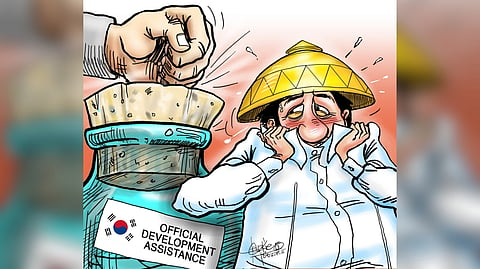
- NEWS
- the EDIT
- COMMENTARY
- BUSINESS
- LIFE
- SHOW
- ACTION
- GLOBAL GOALS
- SNAPS
- DYARYO TIRADA
- MORE

South Korea’s decision to withdraw its Official Development Assistance (ODA) to a project bearing the name of President Ferdinand Marcos Jr. — the PBBM Rural Modular Bridge Project — is an affront to the country, more so the reason for it being the danger of the project being corrupted.
This is worse than a credit downgrade since its effect will ripple through the ODA community which is greatly relied on to finance the infrastructure buildup.
Acting on an investigative report by news outfit Hankyoreh21, South Korean President Lee Jae-myung ordered the immediate suspension of the assistance to the project.
The media report highlighted the corruption risk and suggested the project was revived after influential politician Kwon Seong-dong exerted pressure despite an earlier rejection.
Thus, the report aligned with the official Philippine government line that there was no such financing assistance, although there were suggestions of efforts to revive it.
Lee, in a social media message, emphasized that no funds from South Korea’s ODA agency, the Economic Development Cooperation Fund (EDCF), had been disbursed as the project had not commenced, preventing the misuse of 700 billion won (P28.7 billion) in South Korean taxpayer money.
South Korea’s ODA commitment to the Philippines under the 2022 to 2026 EDCF framework totals $3 billion, or P168 billion, which would make the commission-hungry members of Congress salivate.
Among the projects currently funded through the EDCF are the first phase of the Laguna de Bay beltway worth $905 million and the Panay-Guimaras-Negros Island Bridges Project at $1 billion. South Korea is the sixth most significant source of ODA concessional debts for the country.
EDCF loans have a 0.15-percent per annum interest rate, a 10-year grace period, a 40-year maturity, and 88.4-percent non-repayable components, making them attractive but they have a stringent oversight to prevent misuse.
Recent revelations about the flood control scandal, where hundreds of billions of pesos for infrastructure has been lost to corruption, sparked an in-depth investigation into the ODA project by Korean media.
In a late-night response on Wednesday, the Department of Finance said the P28-billion Rural Modular Bridge Project was proposed for financing by the government of France, not South Korea.
It indicated, however, that the project was initially considered for funding by South Korea but the Department of Agrarian Reform (DAR), which will undertake it, decided to halt discussions last year due to its non-alignment on scope and other key technical specifications.
Seoul media reports indicated that the Ministry of Strategy and Finance (MoSF), which oversees the EDCF, evaluated the loan application in late 2023 and a site visit was made in December 2023.
During the visit, concerns were raised about the project’s feasibility, particularly due to the complexity of managing 350 construction sites across diverse regions.
The MoSF also flagged potential corruption risks, citing a contractor’s history of poor performance and allegations of corruption in a 1996 bridge project involving 200 bridges, some of which were unusable or not connected to roads. It did not name the contractor.
The MoSF proposed scaling down the project from 350 bridges to 70 bridges, which was when the negotiations were called off.
The Department of Finance decided to look for other bilateral partners that could implement the full scope of the project. Hence, the point raised by the DoF that there was no existing loan for the project with South Korea.
South Korea’s concern was expected since it had ramped up its ODA commitment to the country.
The perversion of the national budget, including the relegation of ODA counterpart financing to conditional funding under unprogrammed appropriations, has begun to have a global ripple effect.
